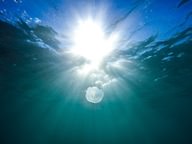9.9海岸污染
章节大纲
-
When is trash in the oceans good?
::海洋里的垃圾什么时候好?Well, not good exactly, but useful. In 1992, a ship lost 28,000 plastic bath toys in the North Pacific. Oceanographers sent out word and people alerted them when they found the toys on beaches . The oceanographers used these findings to ocean currents.
::嗯,不完全好,但有用。1992年,一艘船舶在北太平洋丢失了28 000个塑料浴玩具。海洋学家在海滩上发现玩具时发出消息,人们提醒他们。海洋学家将这些发现用于洋流。Ocean Water Pollution
::海洋水污染The oceans are vast. You might think they are too big to be harmed by pollution. But that’s not the case. Ocean water is becoming seriously polluted. This pollution affects the coasts. It even affects the seas far from shore.
::海洋是广阔的。 你可能会认为海洋太大,无法受到污染的伤害。 但事实并非如此。 海水正在严重污染。 这种污染影响着海岸。 甚至影响远离海岸的海洋。Coastal Pollution
::沿海污染The oceans are most polluted along coasts. Why do you think that's the case? Of course, it's because most pollution enters the oceans from the land. Runoff and rivers carry the majority of pollution into the ocean. Many cities dump their wastewater , water mixed with waste, directly into coastal waters. In some parts of the world, raw sewage and trash may be thrown into the water ( Figure ). Coastal water may become so polluted that people get sick if they swim in it or eat seafood from it. The polluted water may also kill fish and other ocean life.
::海洋沿海岸污染最为严重。 为什么你认为这是事实? 当然,这是因为大部分污染从陆地进入海洋。 径流和河流将大部分污染带入海洋。 许多城市将废水、与废物混合的水直接倾倒到沿海水域。 在世界某些地区, 原始污水和垃圾可能会被丢入水中( 图 ) 。 沿海水可能会变得如此污染, 以至于人们在水中游泳或食用海鲜时会生病。 被污染的水也会杀死鱼类和其他海洋生物 。This coastal ocean water is full of trash and sewage.
::沿海海水里全是垃圾和污水Much of the trash in the oceans is plastic. Many types of plastic do not degrade. Some break down into plastic molecules, but these can also be a pollutant. Plastic shopping bags are extremely abundant in the oceans. Since water runs from land into the sea, chemicals can end up in the sea. Pesticides , herbicides, and fertilizers are among the chemicals.
::海洋中的大部分垃圾都是塑料垃圾,许多类型的塑料不会降解,有些会分解成塑料分子,但也可能是污染物。塑料购物袋在海洋中非常丰富。由于水从陆地流入海洋,化学品最终会流入海洋。农药、除草剂和肥料是化学物质之一。Open Water Pollution
::公开水污染Most of the trash that is in the oceans comes from the land. About 20% comes from ships. Trash is thrown overboard by many vessels. Fishing boats throw over lines and nets.
::海洋中的垃圾大多来自陆地,大约20%来自船只,垃圾被许多船只扔下船,渔船抛下船线和渔网。There is a very large patch of garbage known as the Great Pacific Garbage Patch. Trash from the lands all around the North Pacific gets caught up in currents. The currents bring the trash into the center of the North Pacific Gyre . The concentration of trash increases toward the center of the gyre.
::有一大堆垃圾被称作大太平洋垃圾场。 来自北太平洋各地土地的垃圾被水流堵住。 水流将垃圾带入北太平洋吉雷的中心。 垃圾的集中度会增加到环球的中央。While recognizable pieces of garbage are visible, much of the trash is tiny plastic molecules. The molecules are invisible but are seen in water samples. Plastic confetti-like pieces are also found in the gyre.
::虽然可识别的垃圾碎片是可见的,但大部分垃圾是微小的塑料分子,这些分子是看不见的,但在水样中可以看到。The size of the garbage patch is unknown, since it can’t be seen from above. Some people estimate that it’s twice the size of continental U.S, with a mass of 100 million tons.
::垃圾堆的大小并不为人所知,因为无法从上面看到。 一些人估计,垃圾堆的面积是美国大陆的两倍,质量为1亿吨。Effect on Organisms
::对生物体的影响Animals can be harmed or killed by trash in the oceans. Seabirds and mammals may sometimes accidentally eat plastic bags. This may kill the animals. Fishing nets can entangle fish and other animals so that they cannot escape. Plastic molecules are ingested by organisms. Some that filter water for nutrients may take in a lot of plastic molecules. They may eventually die. Larger fish or humans eat them and may take in the plastics too. Some of the plastics may absorb harmful chemicals.
::海鸟和哺乳动物有时不小心食用塑料袋,这可能会杀死动物; 渔网可以缠住鱼和其他动物,使其无法逃脱; 塑料分子被生物吸收; 养分过滤水可能会吸收大量的塑料分子; 它们最终可能会死亡; 较大的鱼类或人类会吃掉它们,也可能吸收塑料。 有些塑料可能吸收有害化学物质。Plastic bags in the ocean can be mistaken for food by an unsuspecting marine predator.
::海洋中的塑料袋可能被一个毫不怀疑的海洋捕食者 误认为是食物。Reducing Ocean Pollution
::减少海洋污染Everyone can help to keep trash from entering the ocean. Reduce your use of plastics, especially plastic bags. Dispose of trash and chemicals properly. Be sure that coastal communities dispose of trash safely. If you're on a ship, do not dump trash overboard in sensitive locations. Be sure that ships obey laws that protect the seas.
::每个人都可以帮助防止垃圾进入海洋。 减少使用塑料, 特别是塑料袋。 正确丢弃垃圾和化学品。 请确保沿海社区安全丢弃垃圾。 如果您在船上, 请不要在敏感的地方倾倒垃圾。 请确保船舶遵守保护海洋的法律 。Summary
::摘要- Most ocean pollution comes from land and most is found near the coasts. Most of this trash is plastic.
::大多数海洋污染来自陆地,大部分是在海岸附近发现的,其中大部分是塑料垃圾。
- Plastic trash does not usually biodegrade in the ocean. It breaks down into tiny plastic molecules.
::塑料垃圾通常不会在海洋中发生生物降解,会分解成微小的塑料分子。
- Ocean pollutants are harmful to marine organisms.
::海洋污染物对海洋生物有害。
Review
::回顾- What are the consequences of coastal pollution?
::沿海污染的后果是什么?
- Since plastic doesn't biodegrade in the oceans, what happens to it?
::因为塑料不会在海洋中生物降解, 它会怎样呢?
- What can you do to help keep the oceans clean?
::你能做些什么来帮助保持海洋的清洁?
Explore More
::探索更多Use the resource below to answer the questions that follow.
::利用以下资源回答以下问题。- What created the garbage patch?
::是什么创造了垃圾补丁?
- How much stuff does it contain?
::里面有多少东西?
- What makes up 80% of the patch?
::什么占80%的补丁?
- What is the problem with plastic?
::塑料有什么问题?
- Where does the garbage come from?
::垃圾是从哪里来的?
- What are a few of the consequences on marine life of all this plastic?
::这些塑料对海洋生物有什么影响?
- What is the best solution to stop adding to the patch?
::停止加入补丁的最佳解决办法是什么?
- Most ocean pollution comes from land and most is found near the coasts. Most of this trash is plastic.


